JESUS FAREWELL MEAL
Celebrating at Hackbridge and online
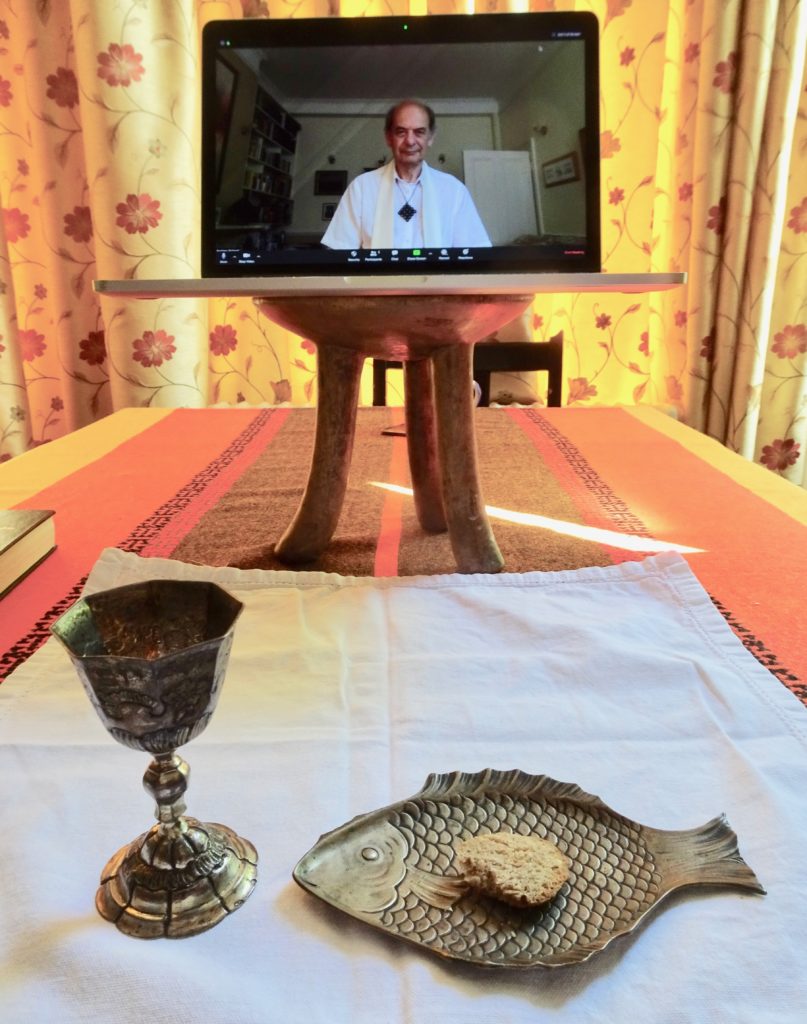
For twenty one years I was the priest-in-charge/vicar of All Saints Hackbridge and Beddington Corner, a small church in the southern suburbs of London, between Croydon and Sutton. Every year I would celebrate Maundy Thursday with a simple meal in church, using the gospel accounts to bring it to life. Last year Linda and I did the same thing on Zoom, with people providing their own food according to a simple list of Passover food which I got from the Israeli newspaper Haaretz.
So when it came to describing Jesus’ last dinner with his closest followers, it was not strange territory. The biggest decision to be made was, was this meal a Passover seder, as Mark and Luke describe? Or was it the day before Passover, and so simply a solemn community meal, as John says it is? Ever since reading “The Testimony of the Beloved Disciple’ by Richard Baukham I have generally taken John’s account seriously. Or perhaps Jesus celebrated Passover a day early?
I chose to follow Mark and Luke, while realising that the question is unresolved.
I have a Jewish prayer book and a beautiful passover seder which I consulted to write this section, together with Gregory Dix;’s massive tome ‘The Shape of the Liturgy’ (1945) which I quoted verbatim for some of the prayers.
Here is what may have happened:
15th Nisan – Passover Eve / First Day of Unleavened Bread – Thursday evening
A Guest Room, Upper City.

The streets of the Upper City were busy with people moving between houses and slaves making last minute preparations. Yeshua and his trainees came to a handsome house in the middle of the Upper City, not far from High Priest’s palace. The smell of roast lamb filled the air as they walked through the courtyard to the steps leading to the main guest room, a large upper room about 12 paces by 8.² The tables had been beautifully set out with many oil lamps on stands around the room as well as lamps on the tables. The tables were in the traditional three- sided arrangement, with Yeshua as the host reclining in the middle of the short table at one side, facing all but one of his trainees. Y’hudah IshK’riot reclined behind him and Yochanan directly in front of him. One of the household servants was just putting the finishing touches to the array of salads and side dishes they would enjoy before starting the meal proper. Yeshua said,
“Thank you for looking after us so well. I hope that the family and yourselves are well provided for?”
“Oh yes, thank you Rabbi. Your talmidim³ had a really good lamb sacrificed for us all, as you saw downstairs.”
“Yes indeed. Now go and join the rest of the household. Just bring us some lamb and the other requirements when you serve it for yourselves.”
When the servant had left, Yeshua took a deep breath and said, “I have longed so much to eat this Pesach supper with you. It will be the last time I eat it before Adonai’s kingly rule becomes a reality. There is suffering to come, but for now let’s enjoy our celebration.” He started the informal eating of the appetisers by blessing the first cup of wine: “Barukh ata Adonai Eloheinu, melekh ha’olam, bo’re p’ri hagefen.⁴ Share this among yourselves. I won’t drink again of the grape until Aalah is king.” He passed it first to Y’hudah IshK’riot and then to Yochanan to share with the rest of the trainees.
The Foot Washing
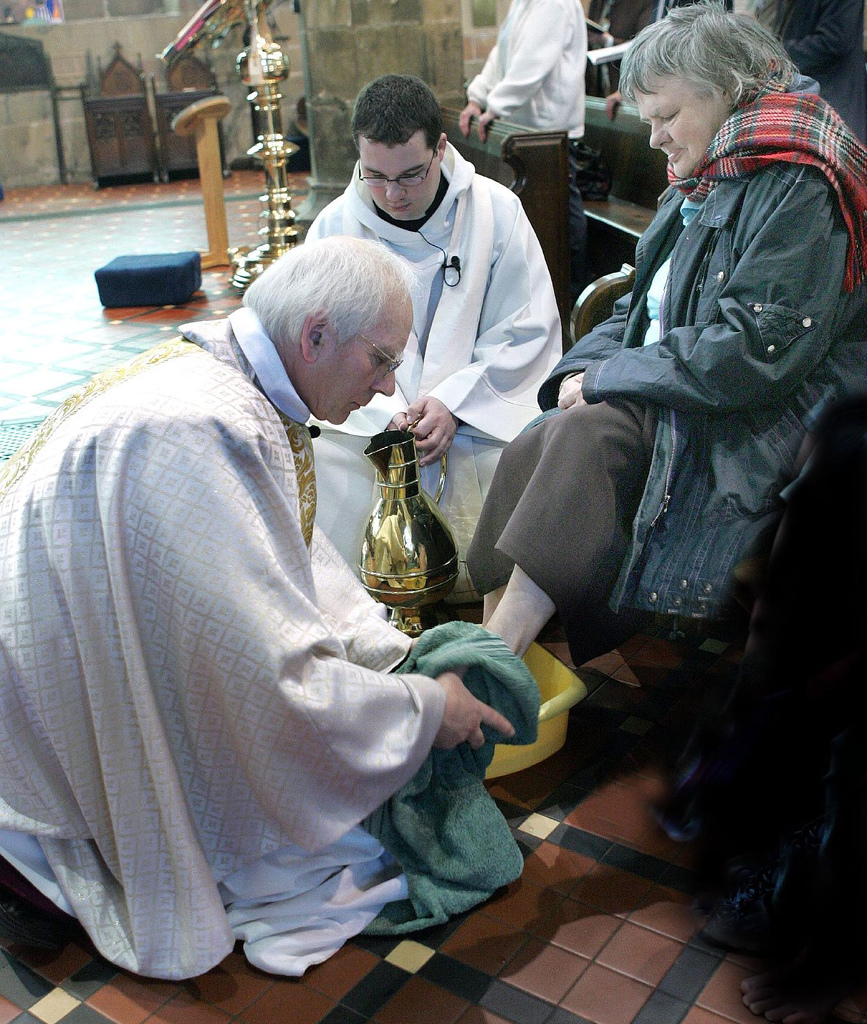
The trainees did not know how to react, whether in anticipation or fear. The normal conversation over the appetisers was quite subdued. Each one said his own blessing over the particular appetisers, and over his own cup of wine. At the far corner a debate started between the two Ya’akovs as to who should volunteer to do the hand washing for everyone at table. Suddenly all voices stopped as Yeshua stood up, took off his cloak, and went to the door. There he tied a linen towel around his waist, poured water from the large water jar into a bowl, and came back to the table. He knelt down at Y’hudah IshK’riot’s feet, splashed a handful of water on his feet, and wiped them dry with the towel. Shock and embarrassment were on the faces of all the trainees.
Yeshua continued along the line of feet of all the reclining men until he knelt before Shim’on Kefa. The big man tried to draw his feet up out of Yeshua’s reach, exclaiming,
“Never, Rabbi! You shall never wash my feet!”
“Shim’on, if I don’t wash your feet, you and I will have nothing in common with each other.”
“Oh! If so, then please wash my hands and head as well!”
Yeshua smiled at Shim’on’s impetuosity. “ You don’t need all that, my friend. All of you have bathed today in preparation for Pesach. So if the dust is off your feet, the whole of you is clean. And you are clean. But not quite all of you.”
The trainees puzzled over this last remark as Yeshua continued the foot washing of all the twelve.. At the end he stood up, put on his cloak and reclined in his place again.
“Do you realise what I have done? You call me Rabban and Maran⁵, and you are correct. I am your teacher and master. So if I, your Rabban and Maran, have washed your feet, you also need to wash each other’s feet. I have set you an example. It’s for you to follow it through.”⁶
Blessing the Bread
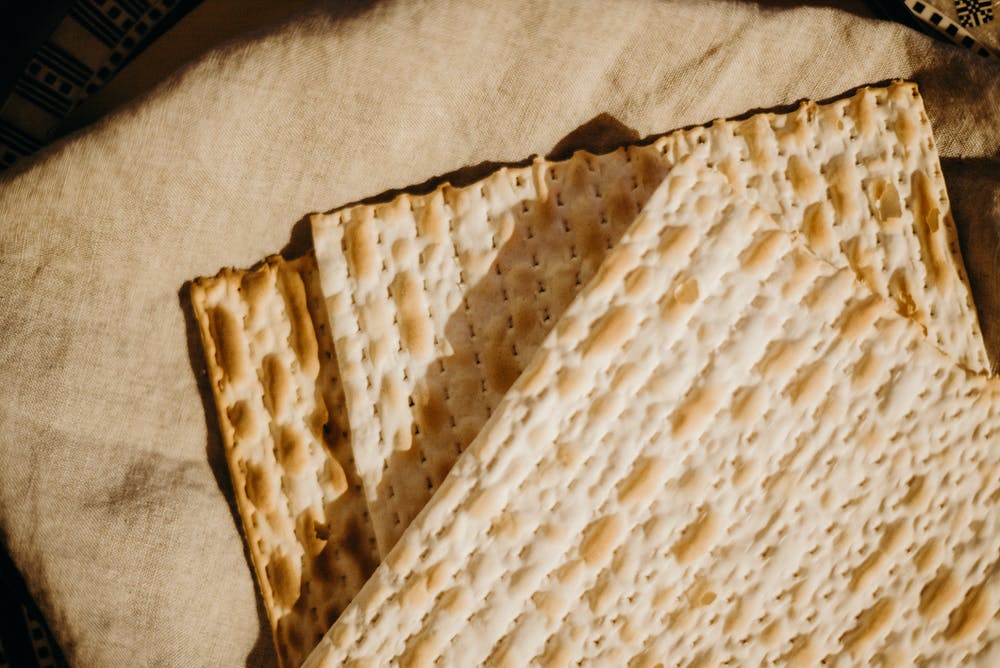
A servant appeared bringing several plates piled with slices of roast lamb, together with the matzot – unleavened flatbread – bitter herbs ands dishes of vegetables. He placed one of each dish in front of Yeshua for him to give the blessings. Yeshua took one of the large flatbreads and broke it in two while saying, “Barukh ata Adonai Eloheinu, melekh ha’olam, hamotzi lehem min ha’aretz.”⁷. Yeshua took a piece himself and reached back to give one to Y’hudah. As it was being passed down the line, Yeshua said, “Take, each of you. This is my body. In the future, do this to remember me.” Anxious whispering filled the room. “What’s he saying? What does he mean? Bread- body? I don’t understand.”
Yeshua stretched out his hand in blessing over the lamb, the flatbreads and the bitter herbs, and gave the explanations.
“ This is the Passover sacrifice of the Lord, who passed over the houses of our fathers in Egypt when he smote the Egyptians.
“This is the dough of our ancestors, which did not have enough time to rise before the King of kings, the Holy One, blessed be he, appeared to them and redeemed them.
“These are the bitter herbs to remind us that the Egyptians embittered the lives of our forefathers in Egypt with hard labour.
Betrayal
Yeshua was silent for a while and his eyes filled with tears.
“Amen, amen, I say to you, one of you will betray me.”
Shock and incredulity’s on the face of all the trainees.
“What? No! That can’t be true! We’ve been really careful, honestly. We’ve not told anyone where we are. The people love you, Rabbi, you’re safe here during the feast, surely.” After the first shock, each began to say, “Rabbi, surely I won’t be the one to be that stupid?”
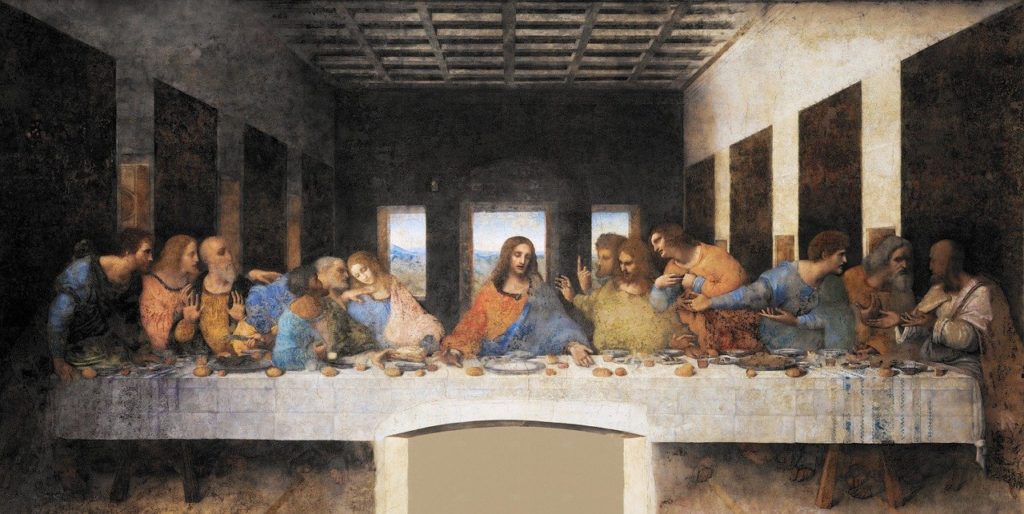
Yeshua said seriously, “it’s one who is sharing bread with me, one of our table fellowship. Didn’t David himself say, ‘Even my bosom friend in whom I trusted, who ate of my bread, has lifted the heel against me.’⁸
Shim’on Kefa nodded at Yochanan and mouthed, “Ask him who it is.” Yochanan leaned back towards Yeshua and whispered, “Rabbi, who is it?’ Yeshua whispered back, “The one I give the bread and charoseth to.”
He took a fragment of bread, dipped it in the mud-like charoseth, a mixture of fruit and nuts, leant back and offered it to Y’hudah, who received it with a muted “I’m honoured, Rabbi.”
“If you need to do something, Y’hudah. now is the time to do it.”
The trainee from Judaea hesitated. Yeshua had turned back and all Y’hudah saw was the back of his head. Gritting his teeth, he got up quickly and disappeared into the night.
“Hullo, where’s Y’hudah gone off to?”
“Dunno. Some business or other. Get something for the festival. Perhaps help some poor soul who’s on his own tonight.”
The Last Command
Yeshua visibly relaxed. “Now my task is done. The will of Aalah has been accomplished, and will be accomplished. Lads, I’m going to be with you only a little longer, and you won’t know where to find me. There’s just one more order I have to give you. Love one another. I have loved you, trusted you, committed myself to you. You do the same for each other. Do I hear an Amen?”
Heartfelt ‘Amens’ went round the room. But the meal had effectively drawn to an end, no one had much more appetite. Yeshua started the final thanksgiving prayer.⁹
Giving Thanks
“Let us give thanks.”
The trainees responded, “Blessed be the Name of the Lord from this time for evermore.”
Yeshua continued,
“Barukh ata Adonai Eloheynu, melekh ha’olam, who feeds the whole world with your goodness, with grace, with loving-kindness and with tender mercy. You give food to all beings, for your loving-kindness endures for ever. Through your great goodness food has never failed us. O may it not fail us for ever, for your great name’s sake. Blessed are you, O Lord, who gives food to all.
“We thank you, Adonai Eloheynu, because you gave as a heritage to our fathers a desirable, good and pleasant land, and because you brought us forth, Adonai Eloheynu, from the land of Egypt and delivered us from the house of bondage; as well as for the covenant which you have sealed in our flesh; for your Torah which you have taught us; your statutes which you have made known to us; for the life, grace and loving-kindness which you have bestowed upon us, and for the food with which you constantly feed and sustain us every day, in every season and at every hour.
“For all this, Adonai Eloheynu, we thank you and bless you. Blessed be your name by the mouth of all living, continually and for ever, as it is written, ‘And you shall eat and be satisfied, and you shall bless Adonai Eloheynu for the good land which he has given you. Barukh ata Adonai, for the food and the land.”
The Last Shock
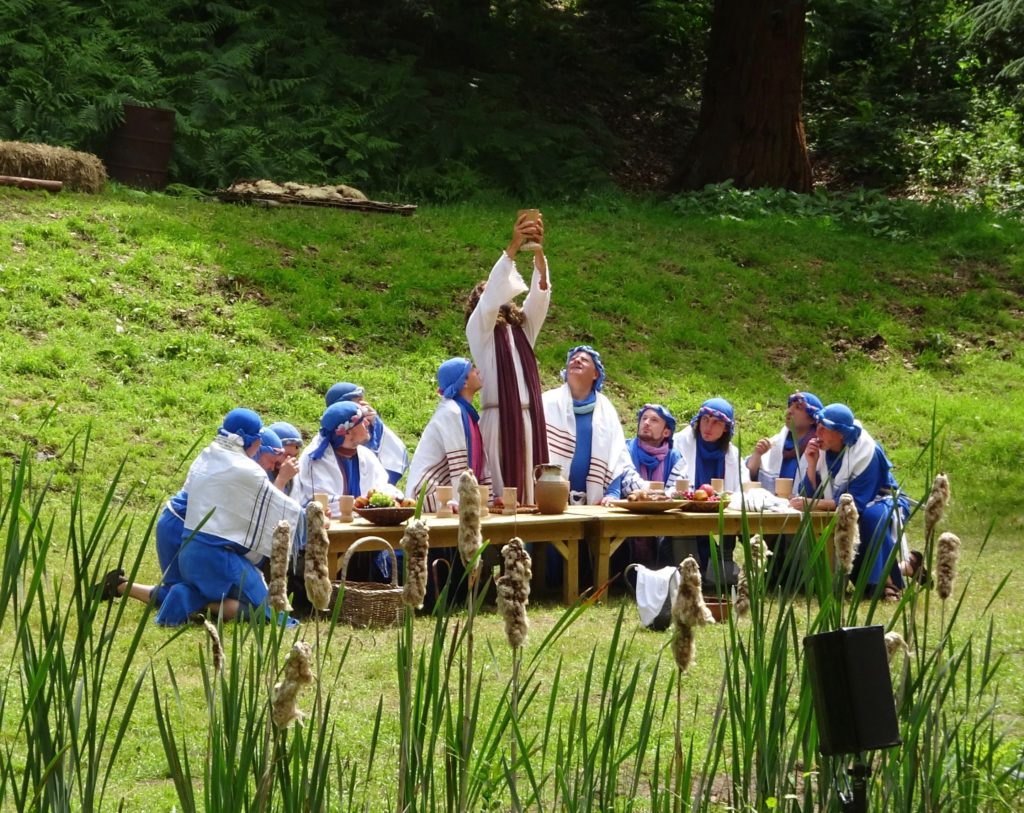
Yeshua now took the final cup of wine, the cup of the blessing, and passed it on round the table. As it went round, he uttered these strange words:
“This cup of wine is the new covenant, the creation of a new community, sealed in my blood, shed for you.”
One of the trainees almost choked while drinking when he heard this. They all just sat, staring at their Rabbi. What had he just said? What blood? The blood of the Temple sacrifices? A new covenant? What was all this about?
Leaving while singing
“Right lads, get up, we’ll sing the Hallel.” The trainees stood and started singing the last five psalms of the Hallel⁹ as they went out of the courtyard into the quiet streets of the city.
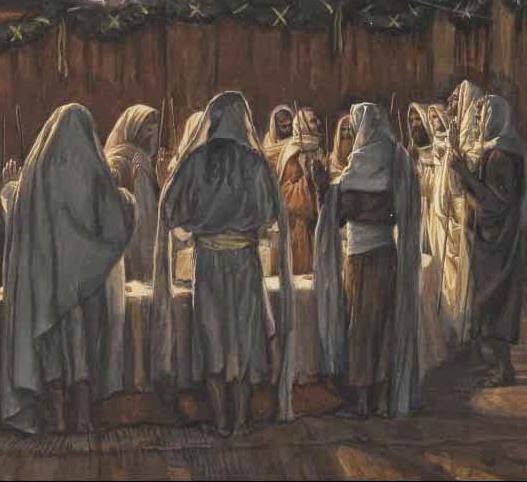
- When Israel went out from Egypt,
- the house of Jacob from a people of strange language,
- Judah became God’s sanctuary,
- Israel his dominion.
- Not to us, O Lord, not to us, but to your name give glory,
- for the sake of your steadfast love and your faithfulness.
- Why should the nations say,
- ‘Where is their God?’
- I love the Lord, because he has heard
- my voice and my supplications.
- Because he inclined his ear to me,
- therefore I will call on him as long as I live.
- Praise the Lord, all you nations!
- Extol him, all you peoples!
- O give thanks to the Lord, for he is good;
- his steadfast love endures for ever!
